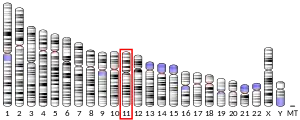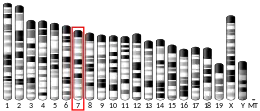OR51M1
Olfactory receptor 51M1 is a protein that in humans is encoded by the OR51M1 gene.[5]
| OR51M1 | |||||||||||||||||||||||||||||||||||||||||||||||||||
|---|---|---|---|---|---|---|---|---|---|---|---|---|---|---|---|---|---|---|---|---|---|---|---|---|---|---|---|---|---|---|---|---|---|---|---|---|---|---|---|---|---|---|---|---|---|---|---|---|---|---|---|
| Identifiers | |||||||||||||||||||||||||||||||||||||||||||||||||||
| Aliases | OR51M1, HOR5'Beta7, OR11-40, olfactory receptor family 51 subfamily M member 1 | ||||||||||||||||||||||||||||||||||||||||||||||||||
| External IDs | MGI: 3030465 HomoloGene: 64935 GeneCards: OR51M1 | ||||||||||||||||||||||||||||||||||||||||||||||||||
| |||||||||||||||||||||||||||||||||||||||||||||||||||
| |||||||||||||||||||||||||||||||||||||||||||||||||||
| |||||||||||||||||||||||||||||||||||||||||||||||||||
| |||||||||||||||||||||||||||||||||||||||||||||||||||
| |||||||||||||||||||||||||||||||||||||||||||||||||||
| Wikidata | |||||||||||||||||||||||||||||||||||||||||||||||||||
| |||||||||||||||||||||||||||||||||||||||||||||||||||
Function
Olfactory receptors interact with odorant molecules in the nose, to initiate a neuronal response that triggers the perception of a smell. The olfactory receptor proteins are members of a large family of G-protein-coupled receptors (GPCR) arising from single coding-exon genes. Olfactory receptors share a 7-transmembrane domain structure with many neurotransmitter and hormone receptors and are responsible for the recognition and G protein-mediated transduction of odorant signals.[6] The olfactory receptor gene family is the largest in the genome. The nomenclature assigned to the olfactory receptor genes and proteins for this organism is independent of other organisms.[5]
See also
References
- GRCh38: Ensembl release 89: ENSG00000184698 - Ensembl, May 2017
- GRCm38: Ensembl release 89: ENSMUSG00000042219 - Ensembl, May 2017
- "Human PubMed Reference:". National Center for Biotechnology Information, U.S. National Library of Medicine.
- "Mouse PubMed Reference:". National Center for Biotechnology Information, U.S. National Library of Medicine.
- "Entrez Gene: OR51M1 olfactory receptor, family 51, subfamily M, member 1".
- Knape K, Beyer A, Stary A, Buchbauer G, Wolschann P (2008). "Genomics of selected human odorant receptors". Chemical Monthly. 139 (12): 1537–1544. doi:10.1007/s00706-008-0957-6.
Further reading
- Bulger M, van Doorninck JH, Saitoh N, et al. (1999). "Conservation of sequence and structure flanking the mouse and human beta-globin loci: the beta-globin genes are embedded within an array of odorant receptor genes". Proc. Natl. Acad. Sci. U.S.A. 96 (9): 5129–34. Bibcode:1999PNAS...96.5129B. doi:10.1073/pnas.96.9.5129. PMC 21828. PMID 10220430.
- Bulger M, Bender MA, van Doorninck JH, et al. (2001). "Comparative structural and functional analysis of the olfactory receptor genes flanking the human and mouse beta-globin gene clusters". Proc. Natl. Acad. Sci. U.S.A. 97 (26): 14560–5. doi:10.1073/pnas.97.26.14560. PMC 18958. PMID 11121057.
- Malnic B, Godfrey PA, Buck LB (2004). "The human olfactory receptor gene family". Proc. Natl. Acad. Sci. U.S.A. 101 (8): 2584–9. Bibcode:2004PNAS..101.2584M. doi:10.1073/pnas.0307882100. PMC 356993. PMID 14983052.
External links
- OR51M1+protein,+human at the U.S. National Library of Medicine Medical Subject Headings (MeSH)
This article incorporates text from the United States National Library of Medicine, which is in the public domain.



